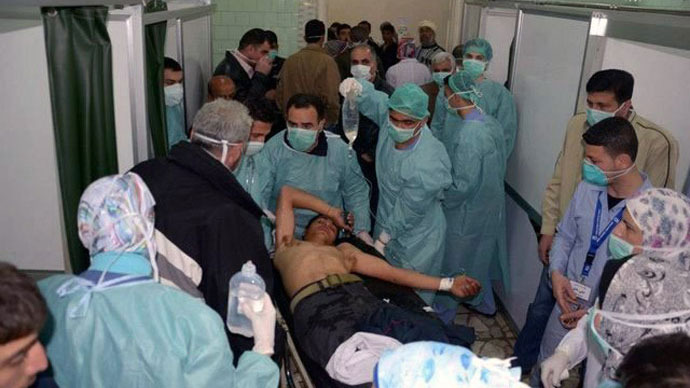US silent as Syrian rebels cross chemical red line

Last week, Syrian officials announced that militants had launched a chemical weapons attack that left 26 people dead and over 100 injured in the northern town of Khan al-Asal.
The toxic-missile attack of March 19 confirmed the international community’s worst fears that either government forces loyal to Bashar Assad or the militant opposition would resort to using chemical weapons in an effort to gain the upper hand in a civil war that has been raging for over two years.
The chemical missile - a crude device believed to have carried
chlorine - was also a disturbing sign that the conflict has crossed
the so-called ‘red line’, which the United States said it would not
tolerate. However, Washington seems unwilling to accept reports
that the Syrian opposition, not the Syrian government, resorted to
these noxious weapons.
US President Barack Obama expressed skepticism that the rebels were
responsible for last week’s apparent act of desperation.
“I am deeply skeptical of any claim that, in fact, it was the
opposition that used chemical weapons,” Obama said in Jordan
when asked about alleged use of chemical weapons in Syria.
“Everybody who knows the facts of the chemical weapon stockpiles
inside Syria as well as the Syrian government's capabilities I
think would question those claims.”
The American leader added that such a move by Assad would be a
“game changer.”
US House Intelligence Committee chair Mike Rogers echoed the US
leader’s comments when he accused the “Assad regime” of the
breach.
"I think that it is abundantly clear that that red line has been
crossed," Rogers told CBS on Sunday. "There is mounting
evidence that it is probable that the Assad regime has used at
least a small quantity of chemical weapons during the course of
this conflict."
The statements coming out of Washington, however, contradict
reports on the ground in Syria.
Syrian journalist, who requested anonymity, told RT that the attack
occurred in an area controlled by government forces, adding that
there is a military station that has been under attack for three
weeks.

The biggest fear since the beginning of the crisis was that the opposition might take control of chemical weapons and that they would fall into the hands of extremist groups, the journalist explained.
Ibrahim Nseir, a local priest, told RT that a doctor who belongs to his church was treating victims of the attack. Many of them could not breathe, Nseir said.
A senior source close to the Syrian Army, described as “a trusted and hitherto reliable source who does not wish to be identified,” told Britain’s Channel 4 news station that the effects of the attack were reported to “induce vomiting, fainting, suffocation and seizures among those in the immediate area.” The Syrian military believes that a “home-made locally-manufactured rocket was fired, containing a form of chlorine known as CL17, easily available as a swimming pool cleaner,” he added.
Chlorine is ranked as Level 2 under the chemical weapons convention, which means it can be used as a weapon as well as for industrial and domestic purposes. Level 1 agents, on the other hand, are chemicals whose sole use is as weapons, such as the nerve agent sarin.
Meanwhile, the militant opposition rejected any responsibility for the incident, blaming the Assad regime for the launching the chemical assault.
But why would the Syrian military unleash chemical weapons on a government-held area, a grievous action that would surely put them out of favor with even their most loyal allies?
Meanwhile, the request for an investigation into the noxious attack was initiated by the government of President Assad.
Ban Ki-moon, the United Nations secretary-general, supported an investigation into the alleged chemical attack that reportedly killed 26, including Syrian soldiers.
Russian Deputy Foreign Minister Gennady Gatilov has said that Russian experts should “definitely” join a team of international experts who will examine the circumstances of surrounding the suspected use of chemical weapons in Syria.
The investigation of chemical weapons in Syria on March 19 “can provide a well-balanced team of international experts, the members of which should include representatives of five permanent members of the UN Security Council, including Russian and Chinese chemists," the deputy minister said via Twitter.
Regardless of the results of the investigation, it seems that the Obama administration has already made up its mind as to the identity of the perpetrators.
Although Washington has worked with regional allies to prepare in the event that the “Assad regime” resorts to the use of chemical weapons, it doesn’t seem it has any contingency plan in the event that the militant opposition, which it is so determined to support, gets its hands on these very real weapons of mass destruction.
That would be the real "game changer."
Robert Bridge, RT
The statements, views and opinions expressed in this column are solely those of the author and do not necessarily represent those of RT.
The statements, views and opinions expressed in this column are solely those of the author and do not necessarily represent those of RT.












